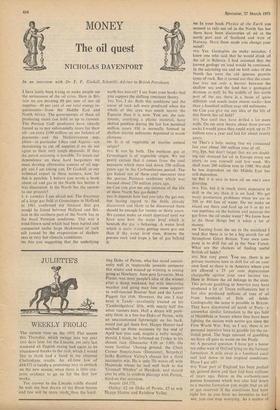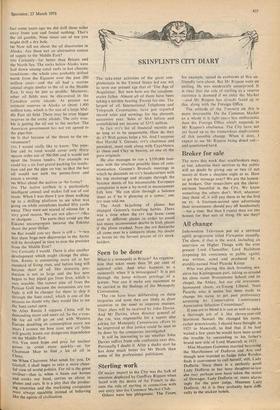MONEY The oil quest
NICHOLAS DAVENPORT
In an interview with Dr T. F. Gaskell, Scientific Adviser to British Petroleum I have lately been trying to make people see the seriousness of the oil crisis. Here in Bri- tain we are drawing 80 per cent of our oil supplies-40 per cent of our total energy re- quirements—from the Middle East and North Africa. The governments of these oil producing states can hold us up to ransom. The Persian Gulf producers have already forced us to pay substantially more for their oil—an extra £100 million on our balance of payments—and the Mediterranean sup- pliers—in particular Libya and Algeria—are threatening to cut off supplies if we do not agree to their very tough demands. If they do, petrol rationing is possible. To lessen our dependence on these hard bargainers we must develop alternative sources of oil sup- ply and I am asking you, Dr Gaskell, as our technical expert in these matters, how far this is possible. I believe you wrote a book about oil and gas in the North Sea before it was discovered. Is the North Sea the answer to our prayers?
T. F. GASKELL I am afraid not. The discovery of a large gas field at Groeningen in Holland in 1961 confirmed my forecast that gas would be found between Holland and Bri- tain in the southern part of the North Sea in the basal Permian sandstone. This was a wind-blown sand which had been buried and compacted under large thicknesses of rock salt caused by the evaporation- of shallow seas in very hot climatic conditions.
ND Are you suggeiting that the underlying
earth has moved? I see from your books that you support the shifting continent theory. TFG Yes, I do. Both this sandstone and the cover of rock salt were produced when the whole of this area was much nearer the Equator than it is now. You see, the con- tinents, overlying a plastic material, have shifted position during the last few hundred million years. Oil is normally formed in shallow marine sediments deposited in warm climates.
ND Is it of vegetable or marine animal origin?
TFG It can be both. The methane gas at Groeningen is of vegetable origin. We are pretty certain that it comes from the coal measures which were laid down 350 million years ago in the Carboniferous period. The gas leaked out of these coal measures into the porous Permian sandstone which was formed about 270 million years ago.
ND Can you give me any estimate of the life of these North Sea gas-fields?
IFG It depends how fast you take the gas out, but having regard to the fields already discovered and likely to be discovered there should be enough for twenty or thirty years. We cannot make an exact appraisal until we have seen how the water level which is beneath the gas is behaving. A water level which is static means getting more gas out than if the water level rises, drowns the porous rock and traps a lot of gas behind it. ND In your book Physics of the Earth you seemed to rule out oil in the North Sea but there have been discoveries of oil in the north part east of Scotland and west of Norway. Have these made you change your mind?
TFG Yes. Geologists do make mistakes. I knew one who said that he would drink all the oil in Bahrein. I had assumed that the known geology on land would be continued. In the adjoining sea and on both sides of the North Sea were the old igneous granitic types of rock. But it turned out that the coast- line was not only a barrier between the shallow sea and the land but a geological division as well. In the middle of this north part of the sea there is a basin of quite different and much more recent rocks—less than a hundred million year old sediments. ND Can you give me any idea of the life of this North Sea oil field?
TFG Not until they have drilled a lot more wells. On my own theory about these porous rocks I would guess they could work up to 25 million tons a year and last for about twenty years.
ND That's a help. seeing that we consumed last year about 100 million tons of oil. TFG ,Ye, but don't forget that we are doubl- ing,our demand for oil in Europe every ten years, as you yourself said last week. We shall want 200 million tons in 1980. We shall be less dependent on the Middle East but still dependent.
ND But it is nice to have oil on one's own doorstep.
TFG Yes, but it is much more expensive to drill in the sea than it is on land. We get nasty production problems when we are in 300 or 400 feet of water. Do we make an island out there and load up on it or do we run pipelines on the bottom and separate the gas from the oil under water? We know how to do these things but it takes a lot of money.
ND Turning from the sea to the mainland I read that there is to be a big search for oil throughout Great Britain. Your own com- pany is to drill for oil in the New Forest. What are the chances of finding useful British oil fields?
TFG Not very great. Von see, there is no private incentive here to drill for oil on your own land as there is in America where you are allowed a 25 per cent depreciation chargeable against your own income tax. Here in Britain the oil belongs to the state. This private gambling in America may have produced a lot of Texan millionaires but it has also produced millions of tons of oil from hundreds of little oil fields. Geologically the same is possible in Britain. They have discovered oil north of Paris—a somewhat similar formation to the gas field at Heathfield in Sussex where they have been lighting the station with native gas since the First World War. But, as I say, there is no personal incentive here to gamble for the na- tional good. The huge amount of gambling we have all goes to waste on the Pools.
ND A personal question. I have got a house ten miles west of Oxford lying on the Jurassic formation. A mile away is a fossilised coral reef laid down in hot tropical conditions. Have I got oil?
TFG Your part of England has been pushed up, ground down and then laid bare millions of years ago. Below in the carboniferous porous limestone which was also laid down as a marine formation you might find an oil or gas reservoir if, the conditions had been right but as you have no incentive to find out, you can stop worrying. As a matter of
fact some years ago we did drill three miles away from you and found nothing. That's the Oil gamble. Nine times out of ten you might drill a dry hole.
ND Now tell me about the oil discoveries in Alaska. Are these not an alternative source of supply to the Middle East?
TM Certainly—far better than Britain and the North Sea. The rocks below Alaska were laid down among coral reefs in hot climatic conditions—the whole area probably drifted north from the Equator over the past 200 million years—and the oil had a marine animal origin similar to the oil in the Middle East. It may be just as prolific. Moreover, other oil fields may be discovered in the Canadian arctic islands. At present we estimate reserves in Alaska at about 1,400 million tons, which is the size of a large Mid- dle East oil field. There may be even bigger reserves in the arctic islands. The only trou- ble is getting the oil out to the market. The American government has not yet agreed to the pipe-line.
ND Is that because of the threat to the en- vironment?
TED I would really like to know. The pipe- line and its road would cover only thirty square miles out of 500.000 and it would not upset the frozen tundra. For example we could lay a six foot gravel packing for insula- tion and put the pipe on top, so that the hot oil would not melt the perma-frost and create a swamp.
ND What about the natives or the fauna?
TFG The native caribou is a particularly intelligent animal and makes full use of our roads. When I was there I saw them walking up to a drilling platform to see what was going on while aeroplanes landed fifty yards away. They were not scared of oilmen for a
very good reason. We are not allol* rifles or shotguns ... The parts they avoid are the Eskimo encampments because the Eskimo shoot the poor things.
ND But would you say there is still a $v,rice that these huge new discoveries in the Arctic Will be developed in time to ease the pressure from the Middle East?
TFG Certainly I would. There is also another development which might change the situa- tion. Russia is consuming more oil as her standard of living rises, and before long will become short of oil. Her domestic pro- duction is not so large and she has now begun to buy piped gas from Iran, which is very sensible. She cannot pipe oil from the Persian Gulf because the mountains are too high; it will be cheaper for them to ship it through the Suez canal, which is one of the reasons no doubt why they would like to see the Suez canal open.
ND After Russia I suppose China will be demanding more and more oil. So the seram- ble for oil will go .on and with Western Europe doubling its consumption every ten Years I cannot see how your new oil fields Will greatly lessen our dangerous dependence on the Middle East.
1-FG You must hope and pray for nuclear Power to come more quickly—or for Chairman Mao to find a lot of oil in China.
ND When Chairman Mao sends for you, Dr Gasket], I shall begin to take a more cheer- ful view of world politics. For oil is the great civiliser—that is, when it heats our homes and cooks our food, carries us about in Planes and cars. It is a pity that the produc- ing countries and the marketing companies must always squabble instead of behaving like the agents of civilisation.











































 Previous page
Previous page